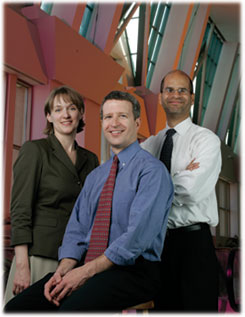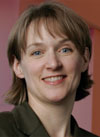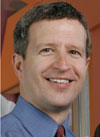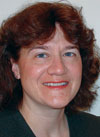
Vol. 78, No. 7, July
2005
Profiles in Pro Bono
Lawyers who provide pro bono legal services to low-income people do
so for many reasons - to help people navigate the justice system, to
provide access to social programs, to help families stay together, to
make sure individual rights are respected. The lawyers profiled here
talk about their pro bono work, their reasons for doing it, and how they
got involved.
by Dianne Molvig
 |
| (From left) Attorney Rachel Schneider, Judge Richard Sankovitz, and
State Bar Pro Bono Coordinator Jeff Brown, discuss why and how to do pro
bono work. Photo: Andy Manis. |
 ime constraints,
bottom-line pressures, and struggles to balance work and personal life
stare lawyers in the face every day.
Still, lawyers always have been generous in giving of themselves for the
good of the public - the "pro bono publico" ethic mentioned in the Rules
of Professional Conduct. One of the major aspects of pro bono publico is
providing legal services to people who can't afford to pay for them.
ime constraints,
bottom-line pressures, and struggles to balance work and personal life
stare lawyers in the face every day.
Still, lawyers always have been generous in giving of themselves for the
good of the public - the "pro bono publico" ethic mentioned in the Rules
of Professional Conduct. One of the major aspects of pro bono publico is
providing legal services to people who can't afford to pay for them.
Unfortunately, as much as lawyers give their help, many people cannot
obtain needed legal services because of inability to pay and
insufficient free and low-cost services. Looking solely at the need for
civil legal services, for instance, some 220,000 Wisconsin residents
living below the poverty line needed such services in 2003. Of those, an
estimated 29 percent actually sought legal help. And of the latter, only
about one-fourth were able to get services from Wisconsin's three
largest civil legal services programs (Wisconsin Judicare, Legal Action
of Wisconsin, and the Legal Aid Society of Milwaukee).
With ever-shrinking government funding for legal services programs
for low-income people, the demand for services may always far exceed the
supply. Still, many Wisconsin lawyers do what they can to try to make
the situation better, one case at a time. Here, a few of these attorneys
talk about their pro bono legal practice, their reasons for doing it,
and how they got involved in the first place.
On Tour
Long before she became a lawyer nine years ago, Rachel Schneider
heard accounts of the obstacles people face in getting legal help.
Having an attorney father and a mother who was the executive director of
a sexual assault and domestic abuse crisis center, "We talked about
situations in which the legal system can be less than friendly and
supportive," recalls Schneider, now an environmental lawyer in
Milwaukee. Thus, even in her law school days, she knew pro bono practice
would be part of her life as a lawyer.
Richard Sankovitz also got started with pro bono work early in his
career, when he was a new lawyer at Chicago-based Jenner & Block, a
firm nationally recognized for its pro bono commitment. Throughout his
days as an attorney, he says, "I always wanted to have one pro bono file
open" at any given time. He followed that self-imposed guideline until
he became a Milwaukee County circuit court judge nine years ago. Because
he could no longer represent pro bono clients, Sankovitz says, "I needed
another outlet for that interest."
 |
"You have other people
to bounce off ideas," says Rachel Schneider about the advantage of
joining a pro bono team. "You're not alone in doing the
work. And there's what I call positive peer pressure. Someone is
going to know if you drop out." |
 |
"What we do is give lawyers a
practical, manageable, easy-to-learn way to do pro bono work,"
says Richard Sankovitz of the Pro Bono Road Show that he conducts with
Schneider. "Once they've started, they find the work fulfilling,
and it perpetuates itself." |
 |
"To me, it's just giving back
a little bit in return for the privilege of practicing law," says
Tim Young about taking Legal Action cases. |
He's found that outlet by teaming up with Schneider to conduct a "Pro
Bono Road Show," one of several pro bono promotional programs conducted
under the auspices of the Milwaukee Bar Association's Legal Services to
the Indigent Committee, which Schneider chairs. In visits to law firms
and presentations to groups of solo and small-firm practitioners,
Sankovitz and Schneider, often accompanied by at least one other
attorney, lead discussions on why and how to do pro bono work.
"What we do is give lawyers a practical, manageable, easy-to-learn
way to do pro bono work," Sankovitz says. "Once they've started, they
find the work fulfilling, and it perpetuates itself."
Besides recruiting individual attorneys, Sankovitz and Schneider also
encourage firms to create pro bono teams, in which several firm
attorneys take on a pro bono project together. Sankovitz credits the
team idea to fellow Milwaukee County circuit court judge Mary Triggiano,
who formerly coordinated the Volunteer Lawyers Project at Legal Action
of Wisconsin.
Pro bono teams offer several advantages, Schneider says. "You have
other people to bounce off ideas," she notes. "You're not alone in doing
the work. And there's what I call positive peer pressure. Someone is
going to know if you drop out."
At her firm, Quarles & Brady, Schneider participates in a pro
bono team that works on a project with the Task Force on Family
Violence. Two afternoons each month, the team staffs the restraining
order clinic at the county courthouse. In addition, Schneider is among
those in the firm who volunteer with Legal Action to represent domestic
abuse victims at permanent injunction hearings.
Pro bono teams are up and running at several Milwaukee law firms, but
Sankovitz says his and Schneider's efforts are "still in a toddling
stage." They hope to inspire teams among corporate inhouse attorneys,
and among attorneys who don't work together but who are friends or play
on the same softball team, and so on. When teams become that
commonplace, "I think we'll have shown," Sankovitz says, "that this is
something that's integral for lawyers" in their practice of law.
 |
The possibility of a positive
outcome keeps Leticia Papke motivated to provide pro bono GAL
representation. Of one recent case, Papke explains, "Maybe if I
hadn't been involved, the child would now be adopted, and the
mother would be in a worse situation." |
 |
"It sounds corny," Bob Hanson
says of the good feeling he gets helping someone in need. "But the
reward is seeing someone obtain justice and be included in a system [in
which] so many people are outsiders." |
Still in the Game
The word "integral" is applicable to Tim Young's approach to pro
bono. His pro bono service is "just part of the ball game," he says. In
his 32 years as an attorney, he's taken pro bono cases ever since he
came to Oshkosh to practice law 27 years ago.
From the beginning, Young has been a volunteer attorney for the
organization then called Legal Services of Northeastern Wisconsin, which
has since merged with Legal Action of Wisconsin. "I heard they needed
people to do pro bono work," he recalls. "So I did it. It was that easy.
There was no great epiphany."
Still, Young's efforts go above and beyond the call of duty. His pro
bono work focuses on divorces in situations involving domestic abuse.
When volunteer lawyers sign up with Legal Action for this kind of work,
they agree to take two such cases a year. Young always exceeds the
minimum.
"When Legal Action calls," he says, "we [meaning he and his legal
assistant] try to fit them in. It's the least we can do. To me, it's
just giving back a little bit in return for the privilege of practicing
law."
For Young's pro bono efforts, Legal Action's Oshkosh office recently
recommended him to the American Bar Association's Family Law Section for
an award for outstanding pro bono contributions. "When I heard about
that," he says, "my reaction was, if what I do is noteworthy, then a lot
of lawyers must not be doing anything at all. Maybe everybody could gear
it up a notch."
 |
"The more we cut
benefits, the more rationing of services there will be. It can occur
legally or illegally. When I see it occurring illegally, it fires me
up," explains Ed Marion of his interest in helping people with
grievances in mental health law and disabilities law. |
 |
"I think pro bono work makes me a
better lawyer, because I don't lose sight of the fact that while
the practice of law is a business, it's always about
people," says Sonja Lee of the benefit of providing estate
planning services pro bono to people who are HIV-positive. |
Young says he doesn't keep track of the hours he puts into pro bono,
and as for the personal rewards, "Sometimes you get thanks [from
clients], sometimes you don't," he says. "But that's not why you do
this. You do this because there's a need for it. Whether you get thanks
or not, at least you know you're doing your part."
After 27 years, one might argue that Young already has done his share
in pro bono service, but he has no plans to quit any time soon. "I'm
just getting good at this," he says, "It's like anything else. If you
get experience you can do the work more efficiently, and you're more
confident in what you're doing. So you keep on going."
Sending a Message
The motivations for pro bono practice sometimes reveal themselves in
unexpected ways. At a meeting in Eau Claire of the Kiwanis Club's youth
section, called K Kids, an adult leader asked the youngsters for ideas
to get more young people involved in community service. Should they play
more games at their meetings, for instance, or have more fun nights? To
such suggestions, then 9-year-old Damin Hadorn-Papke responded, "Don't
you think they should just do this to help people?"
"I was so proud of him," says his mom, Letecia Papke, corporate
counsel at Johnson Litho Graphics in Eau Claire. "Maybe that's why I do
pro bono ... to give my kids a message."
For the past eight years, Papke has served as a guardian ad litem
(GAL) for parents in CHIPS (child in need of protection and/or services)
cases. In theory, the county pays her for her work; in reality, she
charges nothing for much of what she does and handles some cases
entirely on a pro bono basis.
"I'll charge for the couple of hours I'm in court," she says, "but I
find it's also necessary to talk to these parents at least once a week
to make sure they follow through on everything. I don't charge for
that."
Her reasoning, she explains, is that parents with court-appointed GAL
representation are expected to reimburse the county for GAL fees, and
often that's one blow too many. "Once the child is out of the home,"
Papke says, "the parents can lose medical insurance and housing, plus
they have to pay child support. So it's like hitting them when they're
down" to add GAL fees to their other troubles. Many simply can't pay
and, as a result, face jail time.
Thus, Papke does what she can to help parents get on track. She bills
the county for a fraction of her actual time or sometimes sends no bill
at all. Plus, she pays malpractice premiums out of her own pocket so she
can take GAL cases. She also makes up any time her GAL work takes away
from her corporate counsel job.
What keeps Papke going is the possibility of a positive outcome. In
one recent case, for instance, she did her usual extras, such as calling
the parent to support and prod her - even phoning each morning to make
sure she got her daughter to school on time. Now the woman holds down a
full-time job, and her daughter is a straight-A student.
"Maybe if I hadn't been involved," Papke says, "the child would now
be adopted, and the mother would be in a worse situation. Maybe I helped
out."
Preventing Casualties
Bob Hanson arrived late to the legal profession, finishing law school
in 1990, at the age of 40. Before that, he was a public school art
teacher in Marinette County, and enjoyed it, he adds. He attributes his
decision to change careers to a blow to the head; he's only half
joking.
Back then, Hanson owned a BSA Thunderbolt motorcycle. Riding on a
country road one day, he struck a bad rut. His head hit the road and,
even though he was wearing a helmet, he suffered a serious concussion.
"Shortly thereafter," he says, "I decided to take the LSAT. I think [the
accident] might have had some influence."
At the University of Wisconsin Law School he completed both clinical
programs offered at that time: the Legal Defense Project and the Legal
Assistance to Institutionalized Persons program. "Those programs opened
my eyes to working with low-income clients," Hanson says. "I liked the
work a lot. I think that's where things gelled for me. Before that, I
wasn't sure what I'd do with a law degree."
After law school Hanson worked as an attorney for the Appalachian
Research and Defense Fund in Kentucky for three-plus years and then
returned to his home state to work for three years at Legal Services of
Northeastern Wisconsin (now Legal Action). In 2000, he set up a solo
practice in Lac du Flambeau, where he takes cases for Wisconsin
Judicare, which pays a nominal fee.
He also tries to assist people in his community who don't meet the
low-income qualifications of legal services agencies or the State Public
Defender, but who still would struggle to pay a lawyer. To make his
services affordable to more people, Hanson has a sliding-fee scale. "We
work out of a home office," he explains. "That's one way we keep our
costs down so we can offer the sliding-fee scale." The "we" includes
wife Dedie, a former social worker turned paralegal.
Whether it's pro bono service or his own sliding-fee cases, Hanson
finds the work fulfilling. "It sounds corny," he says. "But the reward
is seeing someone obtain justice and be included in a system [in which]
so many people are outsiders. They would just get run over if they
didn't have some help."
Natural Instincts
A similar line of thinking motivates Madison attorney Ed Marion to do
pro bono service. He feels most drawn to helping people with grievances
in the areas of mental health law and disabilities law.
Facing ever-tightening budgets, social services agencies must make
increasingly difficult decisions about whom to help, Marion points out.
"The more we cut benefits, the more rationing of services there will
be," he says. "It can occur legally or illegally. When I see it
occurring illegally, it fires me up."
His most recent pro bono contribution involved writing an amicus
brief for a civil rights case brought to the state supreme court on
behalf of mentally incompetent adults in Wisconsin. Marion wrote the
amicus for a coalition of six organizations, including the State Bar's
Elder Law Section, that work with the elderly.
In his regular job, Marion is an attorney for the state's Public
Service Commission (PSC), where he's worked for seven years. In his
diverse 31-year law career, he's also been a state assistant attorney
general, the chief counsel for the state's Department of Health and
Social Services, a Dane County circuit court judge, the chief of staff
for Gov. Tommy Thompson, and a private practice lawyer.
All through his career, Marion has done pro bono work, whenever he
was in a position that allowed it. Now that he's at the PSC, he faces
hurdles common to all government attorneys who do pro bono. The work
must be done entirely on his own time, using only his own resources.
Another impediment he cites is the lack of malpractice insurance, as his
coverage at the PSC doesn't apply to his outside pro bono work. "Without
malpractice coverage," he says, "you're hanging out there." (See the
accompanying sidebar, "Doing Good, Getting Started," to learn about some
solutions to these obstacles.)
Marion, however, prefers to focus on the benefits he gains from his
pro bono work. "It gives me the opportunity to do things I wouldn't
ordinarily get to do," he says. "My work at the PSC is very esoteric. It
doesn't help anybody individually. Collectively, it helps the energy
supply or whatever, but in terms of getting the gratification of one on
one, you can't get that."
He's quick to add, however, that "I'm no pro bono hero," that others
do more than he does, and that, in the end, the reason for anyone to do
pro bono is simple. "That's what we're here for ... to help each other,"
he says.
Keeping Perspective
Anyone with a life-threatening illness faces not only physical
challenges, but also legal ones: setting up guardianships for
dependents, establishing powers of attorney, and so on. In her pro bono
work, Madison attorney Sonja Lee provides these and other estate
planning services for people who are HIV-positive.
"They're appreciative of the peace of mind they get by having legal
documents in place," she says. "They can continue to make decisions, but
also be protected in the event their illness progresses."
Lee began her pro bono service more than a decade ago, when she was
contacted by Legal Action of Wisconsin's Volunteer Lawyer Project. Legal
Action linked Lee with the Madison AIDS Network, and now she gets a
steady stream of referrals directly from the latter. "The credit has to
go to Legal Action and the AIDS Network," Lee notes, "for setting up
systems that make it easy for me to get referrals and manage the
caseload."
Lee has struck on ways to make pro bono a natural part of her work
flow, rather than an added responsibility. "We don't separate those
clients' files," she says. "We integrate the pro bono work with all the
other work our firm does."
She couldn't do this work, she emphasizes, if she didn't have the
wholehearted backing of everyone in her two-attorney firm. Her staff's
role is critical. "It's because of their work and effort that I can
commit time to pro bono," she says. "Lawyers don't do this alone."
Lee acknowledges that a perception may exist that small firms find it
more difficult to devote time and resources to pro bono. "But I'm not
sure that's altogether fair," she says. "I think whether you work in a
large firm or a small firm, it comes down to scheduling and
priorities."
For Lee, finding time for pro bono is worth the effort. "I think pro
bono work makes me a better lawyer," she contends, "because I don't lose
sight of the fact that while the practice of law is a business, it's
always about people. When you run your own business, it's hard not to
have your business hat on all the time. I think for me, pro bono work is
a way to keep a good perspective on the law profession."
Dianne Molvig operates
Access Information Service, a Madison writing and editing service. She
is a frequent contributor to area publications.
Wisconsin Lawyer
